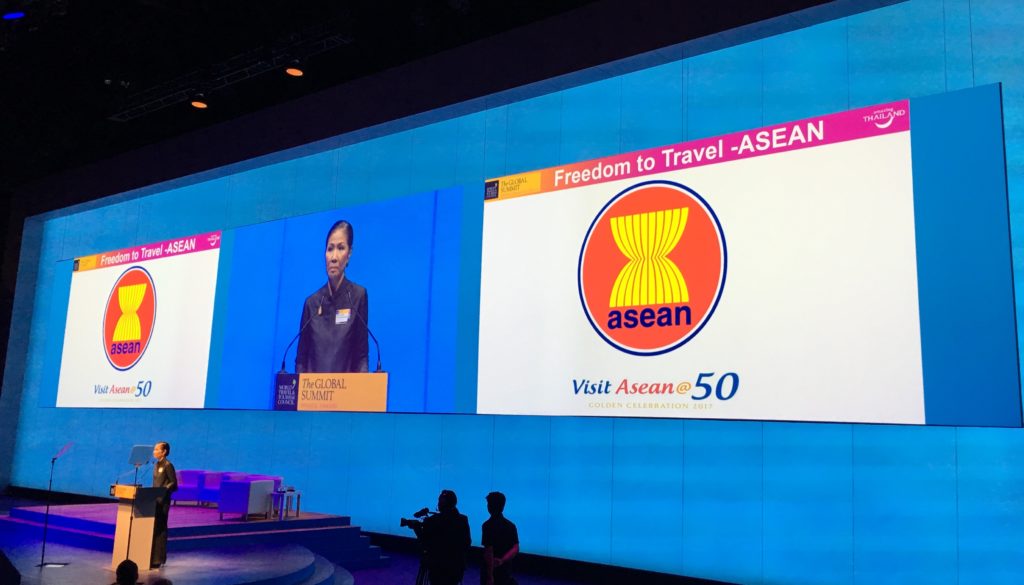
2 May, 2017
The US$5 million WTTC Summit: Did Thailand get money’s worth?
Bangkok – The Royal Thai Government forked out 135 million baht (about US$4 million) in official sponsorship funds to support the WTTC summit. This does not include additional sponsorship funds from other Thai travel industry organisations and the private sector, which would have totalled at least another US$1 million. Millionaire CEOs of some of the world’s largest companies were wined and dined at enormous cost to the Thai taxpayer.
What did Thailand get out of it?
There is no denying the immediate ripple-effect benefits. The summit was attended by many Thai travel & tourism companies, academics and media, all of whom gained an unprecedented opportunity to hear top speakers and network. Thai CEOs broadened their contacts and came up to speed with new trends and opportunities. Many of the academics will be using the vast treasure trove of information to enlighten and enliven their courses.
Local suppliers also gained revenue, knowledge and experience from outsourcing of services such as communications, PCO, audiovisual services, transfers and tours. The local restaurants did rip-roaring business.
People who may not otherwise have come to Thailand, had a chance to see that travel and tourism, business and commerce can still flourish against the backdrop of repression by a military government in a country once known as the “Land of the Free.” The Amazing Thailand logo was prominently positioned in the backdrop of the Press Conference room, ensuring millions of baht worth of global media publicity.
All the Thai stakeholders squeezed as much juice out of it as they could. The Thailand Convention and Exhibition Bureau held at press conference to unveil its MICE-promotion activities. The TAT hosted a lavish dinner at the Queen Sirikit National Convention Centre featuring a gala cultural performance. PATA held a lunch for specially invited guests. Delegates were also taken on a tree-planting exercise by YAANA Ventures, a sustainable tourism facilitator company.
However, the two-way value of the event could have been further enhanced if the global audience had been given a chance to learn more about the travel & tourism experiences of Thailand and ASEAN.
This was the first big-ticket WTTC event held in Bangkok since 1998, and the first WTTC Summit in Southeast Asia. It was also live-streamed to a potential audience of thousands worldwide.
Thailand has just lost a beloved king, the longest reigning monarch in its history. He ascended the throne in the aftermath of World War II and led the country through a turbulent history of nation-building, including warding of communism and colonialism. Perhaps his most lasting legacy will be that of the Sufficiency Economy, one of the best concepts of socio-economic sustainable development in the world today, and entirely in line with the principles of the 2017 Year of Sustainable Tourism Development.
Unfortunately, the Thai people have never mainstreamed this wonderful philosophy. As with many other such systems, we the people of Asia are still plagued by an inferiority complex and only appreciate our indigenous greatness after it gets hailed by someone in the West. The WTTC summit would have been a great opportunity to flag global CEOs on the Sufficiency Economy and help popularise and globalise it, with travel & tourism taking a lead. The only mention of the Sufficiency Economy in the entire summit was a single slide in a presentation by Thai Minister of Tourism and Sports Mrs Kobkarn Wattanavrangkul.
Minister Kobkarn did make a very good impression, as she always does. Her closing speech came from the heart. Members watched her overcome with emotion and openly sob at the closing, tears streaming down both cheeks. Apart from the Tourism Minister, the only two speakers from Thailand were representatives of the Siam Piwat shopping complex and Lebua hotel, both summit sponsors.

Thia tourism and sports minister Mrs Kobkarn Wattanavrangkul flagging the Visit ASEAN campaign. The “Southeast Asia – Feel the Warmth” logo was dropped.
At a broader level, 2017 marked the 50th anniversary of the founding of ASEAN and the 25th anniversary of Visit Thailand Year. It also marked the 20th anniversary of the 1997 economic crisis, which began in Thailand.
It would have been a great opportunity for WTTC members to catch up on the history of ASEAN tourism and get a better SWOT perspective of the future. The Tourism Minister mentioned the ASEAN@50 campaign once. The panel discussion involving speakers from Thailand, Indonesia, the Philippines and Malaysia bordered on the mundane, as the moderator Linda Yueh failed to take up any the real issues relevant to the Summit theme.
I asked the Tourism Authority of Thailand about these missed opportunities. Acknowledging the query, TAT Governor Mr. Yuthasak Supasorn said the entire summit organisation and content was controlled by the WTTC. Although the Thai government footed the bulk of the bills, it did not have much say in shaping the content.
Overall, the return on investment for the Thai taxpayer was probably breakeven. The short-term benefits were clear. The medium- and long-term benefits are debatable.



Liked this article? Share it!